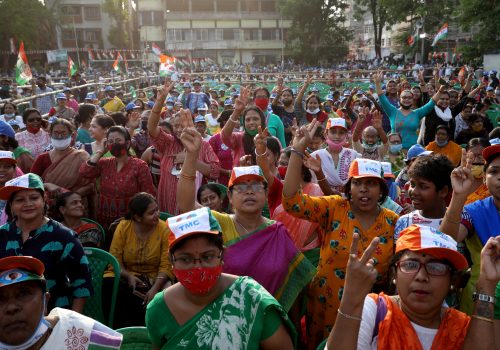The shift from party to personality politics is harming Latin American democracies
This paper is the fourth in the Freedom and Prosperity Center’s “State of the Parties” series analyzing the strength of multi-party systems in different regions of the world.
Across Latin America and the Caribbean, personality-driven political movements and political outsiders are increasingly prevalent, often at the expense of party-based politics. A theme of recent elections in the region has been a widespread embrace of political figures and movements vowing to upend the status quo. From Ecuador to Argentina to Guatemala, political outsiders have unseated the establishment. Meanwhile, recently formed, ideologically vague political movements in Mexico and El Salvador overtook the traditional parties that they broke away from to win landslide elections. With few exceptions, the region has failed to develop competitive, institutionalized, and programmatic parties. This breakdown in party systems and proliferation of personality-driven movements has not delivered better results. Improving institutionalized competition among programmatic, ideologically distinct, and identifiable parties would bolster Latin American democracy, delivering citizens freedom and prosperity.
Within the past decade, several countries with once seemingly institutionalized party systems, such as El Salvador and Mexico, collapsed as parties lost their grip on power to personality-driven figures and movements. Others, like Ecuador and Guatemala, have systems that appear to provide a wide variety of options to citizens through a great proliferation of parties. These systems are unpredictable to citizens, and parties are unable to develop the structure, ideology, and institutionality necessary to deliver solutions to citizen’s needs.
This piece examines how political parties across four Latin American countries in two types of systems have failed to serve as effective vehicles for delivering democracy, and what must change for parties in the region to succeed. We examine the breakdown of the formerly institutionalized party systems in Mexico and El Salvador, and the persistently weak parties in Guatemala and Ecuador. Each country’s experience illustrates how a lack of programmatic parties has contributed to poor governance, which fails to adequately deliver essential services to citizens, potentially undermining democracy and the freedom it should deliver. For each case, we reference data from the Atlantic Council Freedom and Prosperity Indexes and other sources to illustrate the critical role of parties in advancing democracy.
Related content
Explore the series

The Freedom and Prosperity Center aims to increase the prosperity of the poor and marginalized in developing countries and to explore the nature of the relationship between freedom and prosperity in both developing and developed nations.
Image: Demonstrators take part in an anti-corruption protest to back President-elect Bernardo Arevalo's transition, after the suspension of his party by electoral authorities, in Guatemala City, Guatemala, September 2, 2023. REUTERS/Josue Decavele


